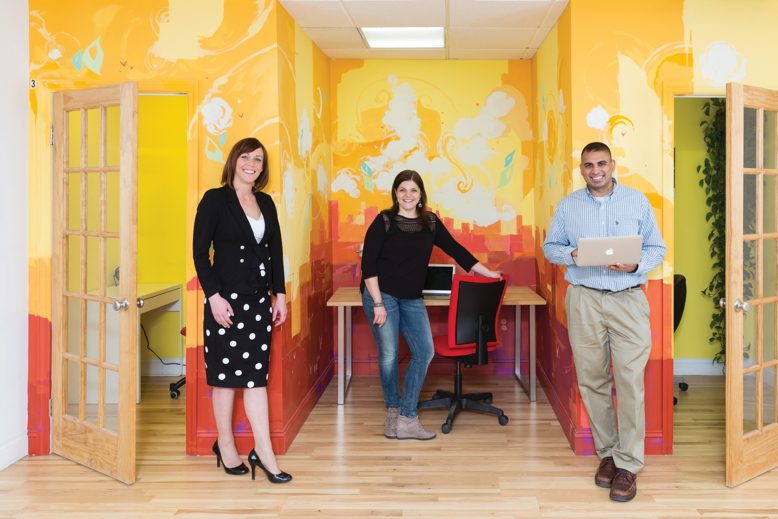
Benoy Thanjan had been running his solar-energy consulting firm out of his Jersey City apartment for nine months. Then he saw a billboard in the Grove Street PATH station for Indiegrove, a coworking space in town that could be tried out for free on Fridays. Thanjan went in for two hours and signed on as a member.
“Being an entrepreneur can be lonely,” says Thanjan, 40. “Not a lot of people relate to it.” The Indiegrove office, just two blocks from his apartment, provides opportunities to interact with other entrepreneurs in different industries. That gives Thanjan a sense of community; it can also be good for business. In his first two years at Indiegrove, Thanjan has connected with other members—including one who owns a roofing company—and may offer solar options to their clients.
Beyond networking, Indiegrove gives a more professional sheen to Thanjan’s business, Reneu Energy, which assists solar companies with financing, contracting and other services. When seeing clients, Thanjan can reserve a private meeting room. Instead of receiving mail at his apartment, he has a mailbox at the Indiegrove address.
Indiegrove is one of several coworking spaces that have sprung up in New Jersey in recent years. They provide entrepreneurs, freelancers and small companies with professional workspaces, conference rooms and a host of services, including in-house educational and networking events. (Thanjan took advantage of a WordPress course to design his own website and a LinkedIn class to help market his firm.)
While private rooms are available for meetings, the coworking facilities typically are designed as open spaces—no cubicles—to encourage the sharing of ideas. Inspired by Silicon Valley’s open, collaborative work environments, members take a seat around a large shared table, pull out their cell phones and laptops, and get to work. Eavesdropping is an accepted part of the culture; listen closely and you might learn something.
Zahra Amanpour launched Indiegrove in January 2013—six months after quitting a six-figure job working for the New York City Department of Small Business Services. She leased a 6,000-square-foot space—formerly a fitness center—and equipped it with a kitchen, meeting rooms, communal tables, WiFi, fax machines and copiers. A strong start set the pace, and now business has grown to 120 monthly members and another 30 who come on an as-needed basis for meetings.
The New Jersey Economic Development Authority recently granted Indiegrove and two other coworking businesses—Mission50 in Hoboken and CoWerks in Asbury Park—loans totaling nearly $1 million as a way to support early-stage businesses in the state. All three businesses say they are having a hard time keeping up with demand and are using the loans to expand their square footage and create more services for clients.
“The EDA consistently looks for ways that it can respond to changing marketplace needs,” says Timothy Lizura, the EDA’s president and chief operating officer. “Through our continuous interaction with the tech industry, we have found that there is a clear and growing demand from New Jersey entrepreneurs and early-stage businesses for technology-focused shared office space.”
Coworking spaces typically offer weekly or monthly memberships. Indiegrove and Mission50 charge $350 per month for unlimited access to its coworking facilities and services. Mission50 charges a $20 annual fee and has hourly, daily and monthly rates available. At CoWerks, the monthly fee is $250.
There are more than 3,000 coworking spaces worldwide with more than 160,000 members, according to Emergent Research. Those numbers are expected to grow in five years to 12,000 spaces and more than 1 million members, Emergent says. A majority of the facilities are located in and around metropolitan areas.
Gregory Dell’Aguila, president of Mission50 in Hoboken, was working in real estate development when he received a call from a potential client looking for a coworking space. “I didn’t know what that was,” Dell’Aguila recalls. “I told him, ‘I don’t have what you’re looking for. But I can sell you an office with your own Internet and copy machine.’” The client wasn’t interested. He wanted to be in a collaborative environment.
Sensing a need, Dell’Aguila converted a vacant space at 50 Harrison Street into a coworking business. When Mission50 opened in January 2012, it attracted developers of websites, apps, games and software—much as Dell’Aguila had hoped. What he wasn’t expecting were people in other professions, including bookkeepers, attorneys and corporate telecommuters. “Technology has driven the shift in how humans work,” Dell’Aguila says. But while it is easier to work remotely, he notes that places such as home offices and coffee shops come with distractions.
Coworking can be a boon for start-up companies that don’t want to be tied to a long-term lease or spend a lot of money on office infrastructure. That helps them “grow faster, as well as shrink, if they need to,” says Amanpour.
Some companies have even begun to pay for their employees to work from shared office spaces in order to reduce their own expenses. These companies realize that employees are more productive if they can work close to home at a coworking space, eliminating commuting time and saving physical and mental energy. In fact, coworking businesses say most of their members live close enough to walk or easily commute to their shared offices. Many, Amanpour adds, run into one another outside of the shared space and joke that they “work together.”
With its loan, Mission50 is looking to open a second Hoboken space closer to Stevens Institute of Technology. The aim is to create an accelerator program for university students who wish to pursue their own ventures or work as interns.
CoWerks, located in Asbury Park’s revived downtown, is using its loan to enlarge its 1,600-square-foot space to 8,500 square feet. The expanded facility will include what CoWerks calls a “makerspace,” equipped with 3D printers, laser cutters (for industrial manufacturing applications) and other tools to spur innovation and productivity.
CoWerks cofounders Danny Croak, a former music-business entrepreneur, and Bret Morgan, formerly a programmer and music club owner, worked for years out of their homes. They recognized that coworking could foster creativity. Opening in June 2010—and moving to their current site in April 2013—they have attracted musicians, designers, mobile and software developers, and other creative types.
Coworking spaces in New Jersey also have been launched in Montclair, Princeton, Woodbridge and elsewhere. Services vary. Somerset’s JuiceTank invites aspiring entrepreneurs to pitch ideas for its incubator program, which helps start-ups with funding and mentorship. It also has a game room—an added perk for members.
Some coworking spaces offer members 24/7 access, although that can require a background check. “Some people are night owls,” Amanpour says. “Authors wake up in the middle of the night with an idea and come here to write. Others are trying to build their businesses on the side of their full-time jobs and work after hours.”
Some start-ups house multiple employees in coworking spaces. Rebecca Sibilia launched her company, Edbuild, at Indiegrove. The company, a nonprofit that uses data to help decision makers in education, has a staff of seven who have come from as far as California to work in the Jersey City space. (Indiegrove charges reduced fees for companies with multiple memberships.)
Sibilia says Indiegrove helped her launch in a fiscally responsible way, and that the space aligns with its mission to bring diverse people together to solve problems. “For a nonprofit that is evolving in our mission and thinking, having forced collaboration is perfect for us,” she says.
CoWerks, designed to nurture technology and entrepreneurship at the Jersey Shore, sees an opportunity for New Jersey to become more of an innovation hub. “Technology on the East Coast is exploding,” says CoWerks’s Morgan. “We’re caught in the middle of two thriving ecosystems—New York and Philadelphia. People from here have traditionally been commuting into one of these two places, but we’re now seeing success stories come out of our state.” Among CoWerks members who have successfully launched businesses are the husband-and-wife team Greg and Sara Edgerton, founders of design company Humble Humans; and Craig Phares, owner of digital marketing and media company Six Overground.
Amanpour says she loves working with entrepreneurs on a daily basis. “When you’re around them,” she says, “you get the bug. You get this feeling of, ‘What am I doing?’ and, ‘Am I also going to contribute to the world in some way?’”
Monica Rozenfeld is an editor and freelance writer.

Great post. Thanks for sharing useful information. Keep it up.